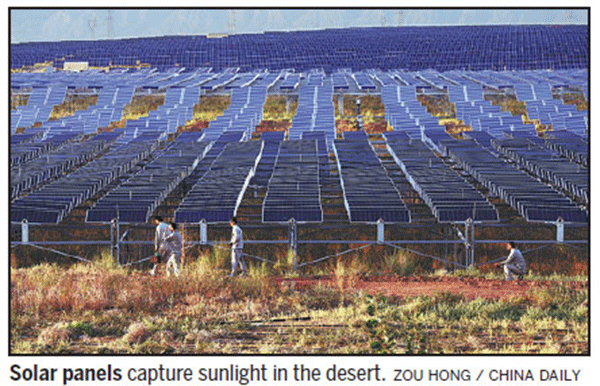Sand dunes and sunshine provide bright prospects

If the relationship between humankind and nature can be called a success because it benefits both parties, the greening of the Kubuqi Desert should be hailed as a miracle.
In the past three decades, Wang Wenbiao - a 58-year-old entrepreneur and a native of the desert - has led the way in bringing greenery via a combination of eco-restoration work and solar technology.
The Kubuqi is China's seventh-largest desert. Located north of Ordos, Inner Mongolia autonomous region, it covers 18,600 square kilometers and was once the source of frequent sandstorms that plagued North China.
Hanggin Nao'er village, Ordos, Wang's birthplace and childhood home, was less than 1 kilometer from the desert. "Dusty winds blew day and night, covering the shabby cottages, poor villagers and barefoot, hungry kids," he said. "I have always been determined to move the desert away from the door of my home."
In 1988, Wang was appointed manager of a salt factory in the desert. In 1997, frustrated by the poor transportation infrastructure, he started building the first road through the sand dunes. To consolidate the roadbed, Wang and 27 colleagues planted succulents, plants that consume little water, and grasses along the route.
The "greening" work he carried out during the following 20 years helped Wang to develop his own business, a multi-industry model that cultivates medicinal herbs and makes full use of the desert's appeal to tourists and its unique resources, such as high levels of sunshine.
Wang is chairman of Elion Resources Group, which has been recognized by the UN for its development of a desert eco-industry that has retarded desertification.
He said the group has "greened" 600,000 hectares of land and helped to lift more than 102,000 people out of poverty.
Elion has also cultivated about 150,000 hectares of licorice fields, generating annual income of 6,000 to 6,750 yuan ($910 to $1,000) per hectare. Moreover, another 20,000 hectares of cistanche (a desert plant that can boost the body's immune system) have also been planted. Both crops can be processed into high value-added medicines.
Based on its experience of anti-desertification work, Elion has also established several pilot projects to convert the desert into farmland and promote an eco-friendly, water-saving agricultural model that will drive organic farming.
In addition, Elion has invented a vertical land-use approach by combining plant cultivation, sheep raising and solar panels in a limited space. The solar panels provide shelter for the plants and sheep. The model has been adopted in a number of other regions and countries, including Pakistan and Saudi Arabia.
In 2011, Elion built the Kubuqi National Desert Park, where tourists can enjoy the natural scenery, including oases and rare local plants, and also experienced local culture and cuisine in a five-star hotel. The site attracts 65,000 tourists a year, and has helped boost tourism in nearby villages.

MOST POPULAR
- 1 China to ease investment restrictions further for foreign firms
- 2 2024 year in review: China's exhibition highlights
- 3 Chinese customs unveils measures to boost development of western regions
- 4 Beijing opens airport service counters for foreign travelers
- 5 China accelerates efforts to build unified national market
Editors' Picks
 Infographic:
The reform and opening-up policy unleashes vitality
Infographic:
The reform and opening-up policy unleashes vitality
 Infographic:
Milestones in China's high-speed railway development
Infographic:
Milestones in China's high-speed railway development





